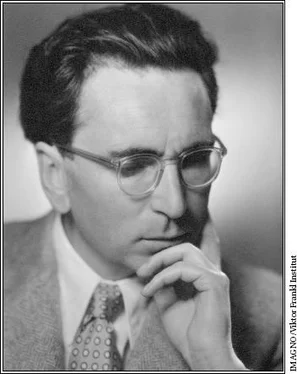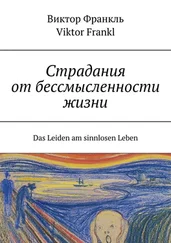Our last day in camp arrived. As the battle-front came nearer, mass transports had taken nearly all the prisoners to other camps. The camp authorities, the Capos and the cooks had fled. On this day an order was given that the camp must be evacuated completely by sunset. Even the few remaining prisoners (the sick, a few doctors, and some “nurses”) would have to leave. At night, the camp was to be set on fire. In the afternoon the trucks which were to collect the sick had not yet appeared. Instead the camp gates were suddenly closed and the barbed wire closely watched, so that no one could attempt an escape. The remaining prisoners seemed to be destined to burn with the camp. For the second time my friend and I decided to escape.
We had been given an order to bury three men outside the barbed wire fence. We were the only two in camp who had strength enough to do the job. Nearly all the others lay in the few huts which were still in use, prostrate with fever and delirium. We now made our plans: along with the first body we would smuggle out my friend’s rucksack, hiding it in the old laundry tub which served as a coffn. When we took out the second body we would also carry out my rucksack, and on the third trip we intended to make our escape. The first two trips went according to plan. After we returned, I waited while my friend tried to find a piece of bread so that we would have something to eat during the next few days in the woods. I waited. Minutes passed. I became more and more impatient as he did not return. After three years of imprisonment, I was picturing freedom joyously, imagining how wonderful it would be to run toward the battle-front. But we did not get that far.
The very moment when my friend came back, the camp gate was thrown open. A splendid, aluminum-colored car, on which were painted large red crosses, slowly rolled on to the parade ground. A delegate from the International Red Cross in Geneva had arrived, and the camp and its inmates were under his protection. The delegate billeted himself in a farmhouse in the vicinity, in order to be near the camp at all times in case of emergency. Who worried about escape now? Boxes with medicines were unloaded from the car, cigarettes were distributed, we were photographed and joy reigned supreme. Now there was no need for us to risk running toward the fighting line.
In our excitement we had forgotten the third body, so we carried it outside and dropped it into the narrow grave we had dug for the three corpses. The guard who accompanied us—a relatively inoffensive man—suddenly became quite gentle. He saw that the tables might be turned and tried to win our goodwill. He joined in the short prayers that we offered for the dead men before throwing soil over them. After the tension and excitement of the past days and hours, those last days in our race with death, the words of our prayer asking for peace, were as fervent as any ever uttered by the human voice.
And so the last day in camp passed in anticipation of freedom. But we had rejoiced too early. The Red Cross delegate had assured us that an agreement had been signed, and that the camp must not be evacuated. But that night the SS arrived with trucks and brought an order to clear the camp. The last remaining prisoners were to be taken to a central camp, from which they would be sent to Switzerland within forty-eight hours—to be exchanged for some prisoners of war. We scarcely recognized the SS. They were so friendly, trying to persuade us to get in the trucks without fear, telling us that we should be grateful for our good luck. Those who were strong enough crowded into the trucks and the seriously ill and feeble were lifted up with diffculty. My friend and I—we did not hide our rucksacks now—stood in the last group, from which thirteen would be chosen for the next to last truck. The chief doctor counted out the requisite number, but he omitted the two of us. The thirteen were loaded into the truck and we had to stay behind. Surprised, very annoyed and disappointed, we blamed the chief doctor, who excused himself by saying that he had been tired and distracted. He said that he had thought we still intended to escape. Impatiently we sat down, keeping our rucksacks on our backs, and waited with the few remaining prisoners for the last truck. We had to wait a long time. Finally we lay down on the mattresses of the deserted guard-room, exhausted by the excitement of the last few hours and days, during which we had fluctuated continu- ally between hope and despair. We slept in our clothes and shoes, ready for the journey.
The noise of rifles and cannons woke us; the flashes of tracer bullets and gun shots entered the hut. The chief doc- tor dashed in and ordered us to take cover on the floor. One prisoner jumped on my stomach from the bed above me and with his shoes on. That awakened me all right! Then we grasped what was happening: the battle-front had reached us! The shooting decreased and morning dawned. Outside on the pole at the camp gate a white flag floated in the wind.
Many weeks later we found out that even in those last hours fate had toyed with us few remaining prisoners. We found out just how uncertain human decisions are, especially in matters of life and death. I was confronted with photographs which had been taken in a small camp not far from ours. Our friends who had thought they were traveling to freedom that night had been taken in the trucks to this camp, and there they were locked in the huts and burned to death. Their partially charred bodies were recognizable on the photograph. I thought again of Death in Teheran.
Apart from its role as a defensive mechanism, the prisoners’ apathy was also the result of other factors. Hunger and lack of sleep contributed to it (as they do in normal life, also) and to the general irritability which was another characteristic of the prisoners’ mental state. The lack of sleep was due partly to the pestering of vermin which infested the terribly overcrowded huts because of the general lack of hygiene and sanitation. The fact that we had neither nicotine nor caffeine also contributed to the state of apathy and irritability.
Besides these physical causes, there were mental ones, in the form of certain complexes. The majority of prisoners suffered from a kind of inferiority complex. We all had once been or had fancied ourselves to be “somebody.” Now we were treated like complete nonentities. (The consciousness of one’s inner value is anchored in higher, more spiritual things, and cannot be shaken by camp life. But how many free men, let alone prisoners, possess it?) Without consciously thinking about it, the average prisoner felt himself utterly degraded. This became obvious when one observed the contrasts offered by the singular sociological structure of the camp. The more “prominent” prisoners, the Capos, the cooks, the store-keepers and the camp policemen, did not, as a rule, feel degraded at all, like the majority of prisoners, but on the contrary—promoted! Some even developed miniature delusions of grandeur. The mental reaction of the envious and grumbling majority toward this favored minority found expression in several ways, sometimes in jokes. For instance, I heard one prisoner talk to another about a Capo, saying, “Imagine! I knew that man when he was only the president of a large bank. Isn’t it fortunate that he has risen so far in the world?”
Whenever the degraded majority and the promoted minority came into conflict (and there were plenty of opportunities for this, starting with the distribution of food) the results were explosive. Therefore, the general irritability (whose physical causes were discussed above) became most intense when these mental tensions were added. It is not surprising that this tension often ended in a general fight. Since the prisoner continually witnessed scenes of beatings, the impulse toward violence was increased. I myself felt my fists clench when anger came over me while I was famished and tired. I was usually very tired, since we had to stoke our stove—which we were allowed to keep in our hut for the typhus patients—throughout the nights. However, some of the most idyllic hours I have ever spent were in the middle of the night when all the others were delirious or sleeping. I could lie stretched out in front of the stove and roast a few pilfered potatoes in a fire made from stolen charcoal. But the following day I always felt even more tired, insensitive and irritable.
Читать дальше












